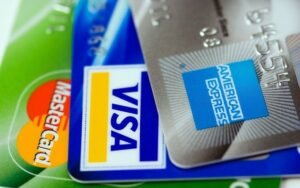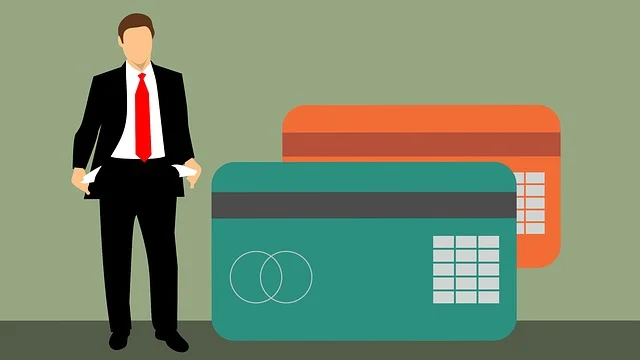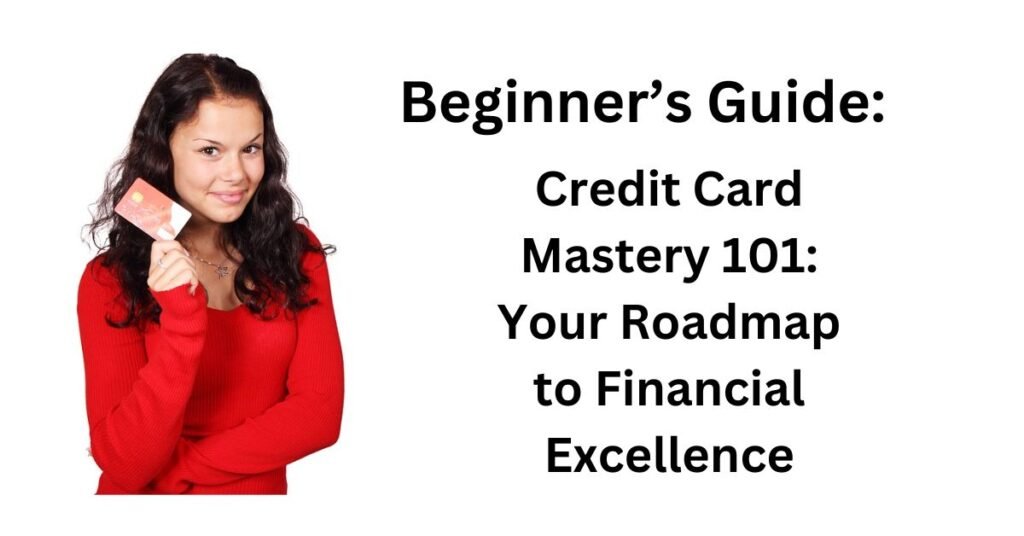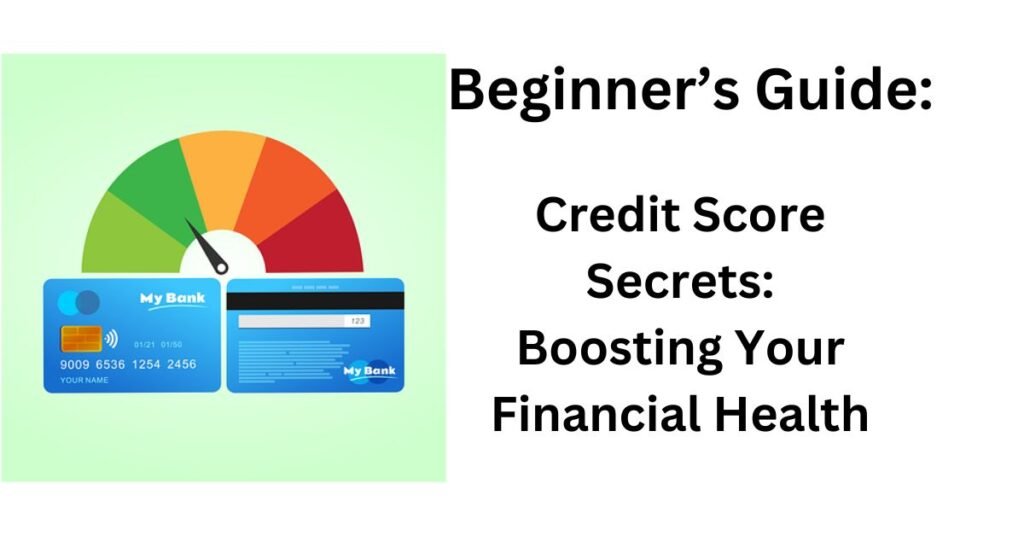Introduction
Mastering the usage of credit cards is a critical component for obtaining financial success and stability in the world of personal finance. When used properly, credit cards may be strong instruments that provide convenience, incentives, and financial flexibility. Misuse or a lack of knowledge, on the other hand, may lead to debt, financial stress, and slowed progress toward one’s financial objectives.
Importance of Credit Card Mastery in Financial Success

The significance of credit card mastery in the quest of financial success cannot be emphasized. These plastic cards are more than simply simple payment methods; they also have a major impact on an individual’s credit history and financial well-being. Several major factors highlight the significance of credit card mastery:
Credit Score Impact:
Credit card use that is responsible has a good impact on your credit score, which is a critical component examined by lenders when you apply for loans, mortgages, or other types of credit. A higher credit score opens the door to lower interest rates and better financial arrangements.
Financial Flexibility:
Credit cards are a practical and adaptable way to manage spending, particularly in crises or unforeseen circumstances. They provide a short-term borrowing solution that may assist bridge financial gaps when utilized appropriately.
Rewards and Benefits:
Many credit cards provide rewards programs, cashback bonuses, and other benefits. Individuals may optimize these advantages by mastering the art of credit card use, earning important points for their regular expenditures.
Debt Management:
Understanding how to handle credit card balances and interest rates is critical for debt management success. Credit card mastery includes tactics for paying off accounts, avoiding high-interest debt, and maintaining a sound financial position.
Brief Overview of What Credit Card Mastery Entails
Credit card mastery is a set of skills and knowledge that focuses on utilizing credit cards to one’s advantage while limiting possible hazards. It involves:
Budgeting:
Understanding and following a budget ensures that credit cards be used within one’s means, reducing overspending and the accumulation of unsustainable debt.
Payment Methods:
Making regular payments, reducing interest rates, and paying off obligations in whole all contribute to a favorable credit history and financial wellness.
Interest Rate Awareness:
Knowing the interest rates on credit cards allows people to make more educated choices regarding carrying balances and selecting cards with advantageous conditions.
Rewards Optimization:
To get the full advantages of rewards programs, cashback offers, and other perks, one must first understand how these programs function and then match credit card use to one’s lifestyle and tastes.
Credit Report Monitoring:
Monitoring one’s credit report on a regular basis enables for the discovery of inaccuracies, the detection of possible fraud, and the general maintenance of a good credit profile.
Finally, credit card mastery is an important part of financial literacy because it allows people to take advantage of credit card advantages while avoiding frequent problems. It enables people to make educated financial choices, establish a good credit history, and achieve long-term financial success.
Understanding Credit Cards

Credit cards are financial instruments that enable cardholders to borrow money up to a certain limit in order to make purchases or pay for services. These cards provide a constant source of credit, which means customers may carry a debt from month to month while incurring interest costs. Understanding credit cards entails investigating their definitions, different kinds, advantages, hazards, and influence on credit ratings.
Definition and Types of Credit Cards
- Definition: A credit card is a plastic card provided by a financial institution that allows its bearer to make credit purchases. The cardholder agrees to return the borrowed amount, plus any interest and fees.
- Types of Credit Cards:
- Standard Credit Cards: Basic credit cards with a predetermined credit limit.
- Rewards Credit Cards: Offer incentives such as cashback, travel rewards, or points for specific purchases.
- Secured Credit Cards: Requires a security deposit and is typically used to build or rebuild credit.
- Charge Cards: Require full payment of the balance each month; no revolving credit.
Benefits and Risks Associated with Credit Card Usage
- Benefits:
- Convenience: Credit cards offer a convenient and widely accepted method of payment.
- Rewards and Perks: Many credit cards provide rewards, cashback, or other perks for using the card.
- Emergency Funding: Credit cards can serve as a source of emergency funds when needed.
- Builds Credit History: Responsible credit card use contributes to a positive credit history.
- Risks:
- Interest Charges: Carrying a balance from month to month incurs interest charges, potentially leading to debt.
- Fees: Late payment fees, annual fees, and other charges can accrue if not managed carefully.
- Overspending: Easy access to credit may lead to overspending beyond one’s means.
- Credit Score Impact: Mismanagement can negatively affect credit scores.
How Credit Cards Impact Credit Scores
- Credit Utilization: The ratio of credit card balances to credit limits affects credit scores. Lower utilization is generally favorable.
- Payment History: Timely payments positively impact credit scores, while late payments and defaults have adverse effects.
- Length of Credit History: The age of credit card accounts influences credit scores; longer histories are generally beneficial.
- New Credit: Opening multiple new credit cards in a short period may negatively impact credit scores.
- Types of Credit: Having a mix of credit types, including credit cards, can positively impact credit scores.
Understanding how credit cards affect credit scores entails identifying the interrelated components that determine creditworthiness. Responsible credit card use, regular payments, and smart management all contribute to a strong credit profile, allowing access to better financial conditions and prospects.
Is It Possible to Achieve Credit Card Mastery?
Debunking Common Myths about Credit Cards
1. Myth: More Credit Cards Mean Better Credit:
- Reality: While having a variety of credit kinds is advantageous, the number of credit cards does not alone define trustworthiness. Responsible use and timely payments have a greater influence.
2. Myth: Carrying a Balance Boosts Your Credit Score:
- Reality: Carrying a debt may result in interest payments, but it has no effect on your credit score. Paying accounts in whole and on time has a good impact on creditworthiness.
3. Myth: Closing Credit Cards Improves Your Credit Score:
- Reality: Closing credit cards may have an impact on your credit usage ratio and credit history length, possibly decreasing your credit score. It is frequently preferable to keep accounts open, particularly if they have a good track record..
4. Myth: Credit Cards Are Only for Emergencies:
- Reality: Credit cards are useful financial instruments. Responsible use of credit for regular purchases, paired with on-time payments, may help build a solid credit history.
Real-Life Success Stories of Individuals Who Mastered Credit Card Usage
Case Study 1: Building Credit Responsibly:
- Success Story: Jane, who had no credit history, utilized a secured credit card to build credit. She gradually moved to unsecured cards, displaying prudent usage and raising her credit score.
Case Study 2: Maximizing Rewards:
- Success Story: Mark utilized a rewards credit card strategically for his normal spending, collecting cashback and trip benefits. He received the advantages without incurring interest charges by settling the bills in full.
Case Study 3: Overcoming Debt Challenges:
- Success Story: Sarah was in credit card debt, but she took proactive measures. She negotiated cheaper interest rates, made a budget, and paid off debt in a methodical manner. Her methodical approach resulted in financial stability.
Steps to Take for Those with Poor Credit Seeking Credit Card Mastery
1. Assess Your Credit Situation:
- Obtain a copy of your credit report to understand your current standing and identify areas for improvement.
2. Secure a Secured Credit Card:
- Consider getting a secured credit card, which requires a deposit.
3. Create a Realistic Budget:
- Establish a budget that allows you to cover essential expenses and make timely credit card payments. Avoid unnecessary spending.
4. Negotiate with Creditors:
- If you are experiencing financial difficulties, contact your creditors to explore repayment options or to negotiate reduced interest rates. Many creditors are eager to engage with troubled persons.
5. Educate Yourself:
- Discover the basics of credit card use, interest rates, and credit ratings. To make educated judgments, understand the terms and conditions of your credit cards.
6. Seek Professional Advice:
- Consider consulting with a financial counselor or advisor to receive personalized guidance on improving your credit situation.
Credit card mastery is attainable via knowledge, discipline, and effective financial planning. Individuals may understand credit card use and develop a sound financial foundation by refuting misconceptions, learning from real-life success stories, and taking proactive measures.
Can You Build Credit Without Credit Cards?
Building credit without using credit cards is achievable, since there are other ways to create and increase your creditworthiness. While credit cards are widely utilized for this purpose, there are other credit-building tactics available.
Exploring Alternative Methods to Build Credit
1. Credit Builder Loans:
- These are credit-building loans for people. The borrower makes set monthly payments, and after the loan is paid off, the credit agencies publish the good payment history.
2. Secured Loans:
- Secured loans, like secured credit cards, need collateral. When payments are paid on time, these loans, such as secured personal loans or vehicle loans, may be used to establish credit.
3. Rent Reporting Services:
- You may submit your rental payments to credit bureaus via certain providers. A good rental payment history might help you create a good credit history.
4. Retail Installment Plans:
- Some businesses provide financing or payment plans for goods. Payments on these programs may be reported to credit bureaus on a regular basis.
5. Credit Union Programs:
- Credit unions may provide credit-building programs such as share-secured loans or credit-builder accounts to assist with credit establishment.
Pros and Cons of Credit Card-Free Credit-Building Strategies
Pros:
- Diverse Credit Mix:
- Utilizing alternative methods provides a diverse credit mix, which can positively impact your credit score.
- No Risk of Credit Card Debt:
- Without credit cards, there’s no risk of accumulating credit card debt if you struggle with self-control or budgeting.
- Structured Payments:
- Credit builder loans and secured loans typically involve structured payments, making it easier to budget and manage.
Cons:
- Potentially Slower Process:
- Building credit without credit cards might be a slower process compared to credit cards, which allow for more frequent reporting of payment history.
- Limited Access to Credit:
- Without credit cards, you may have fewer credit options available to you, potentially limiting your ability to establish credit quickly.
- Fewer Rewards and Benefits:
- Credit cards often come with rewards and benefits that other credit-building methods may lack.
Tips for Responsibly Building Credit Without a Credit Card
1. Make Timely Payments:
- Ensure that all payments, whether on loans or other credit-building methods, are made on time.
2. Monitor Your Credit Report:
- Regularly check your credit report to ensure that the information is accurate and reflects your positive payment history.
3. Diversify Credit Types:
- If possible, use a combination of credit-building methods to create a diverse credit profile.
4. Keep Balances Low:
- If you have installment loans, aim to keep the balances relatively low to maintain a favorable credit utilization ratio.
5. Explore Credit Union Programs:
- Credit unions often have programs specifically designed to help members build credit. Investigate these options in your local area.
Building credit without credit cards requires a calculated and methodical strategy. Individuals may construct a solid credit history without depending on credit cards by investigating alternate ways, recognizing the advantages and downsides, and adopting appropriate credit-building habits.
Why You Should Master Credit Card Usage
Benefits of Responsible Credit Card Usage
1. Building a Positive Credit History:
Responsible credit card usage helps to build a strong credit history, which is essential for getting favorable loan, mortgage, and other financial product conditions.
2. Credit Score Improvement:
Mastering credit card utilization by making on-time payments and managing credit responsibly may result in a higher credit score, which will benefit your overall financial health.
3. Financial Flexibility:
Credit cards are a convenient way to manage costs and deal with unforeseen financial difficulties. Mastery enables you to utilize this financial weapon effectively and avoid going into debt.
4. Rewards and Perks:
Many credit cards include rewards programs, cashback, and other benefits. You may optimize these advantages by mastering credit card use and collecting important rewards for your purchases.
5. Emergency Preparedness:
Credit cards may act as a financial safety net in times of need. Understanding how to utilize them means that you have access to cash when you need them without having to rely on high-interest loans.
How Credit Card Mastery Contributes to Financial Freedom
- Debt Avoidance and Management:
- Credit card mastery entails tactics for avoiding high-interest debt accumulation. By efficiently managing balances, you free up financial resources that may be allocated toward savings and investments.
- Lower Borrowing Costs:
- Building a solid credit history via credit card mastery helps you to get credit at cheaper interest rates. This leads to lower borrowing rates over time.
- Smart Money Management:
- Understanding credit card use is part of general financial literacy. It adds to good money management, which leads to financial independence, when paired with budgeting and investing skills.
- Enhanced Purchasing Power:
- A solid credit history allows you to make large purchases, such as a house or automobile, with advantageous financing arrangements. This enhanced buying power is an important part of financial independence.
Avoiding Common Pitfalls and Financial Traps
- Overspending:
- Mastering credit cards entails creating and keeping to a budget, avoiding the traps of overspending and debt accumulation that may stifle financial independence.
- High-Interest Debt:
- It is critical to avoid the trap of high-interest debt. To avoid long-term financial pressure, mastery involves knowing interest rates, paying accounts in full, and managing credit sensibly.
- Minimum Payment Mentality:
- Mastering credit card use entails staying out of the minimum payment trap. Paying just the bare minimum each month leads in a longer payback period and higher interest costs.
- Lack of Emergency Fund:
- Relying only on credit cards for emergencies without first saving for one might lead to a debt spiral. Mastering credit cards entails establishing a financial safety net via savings.
- Impulse Spending:
- It is critical to understand and manage impulsive spending. Credit card mastery entails making careful, educated purchasing selections rather than falling to impulsive spending behaviors.
To summarize, understanding credit card utilization is a critical component of gaining financial independence. Responsible usage results in a favorable credit history, higher credit ratings, and access to financial instruments that may improve your overall financial well-being. By avoiding typical errors, credit cards may be used as a positive financial tool rather than a cause of financial stress.
Ways to Master Credit Card Spending

Budgeting Strategies for Credit Card Users
- Create a Comprehensive Budget:
- Create a thorough budget that includes your monthly revenue as well as any essential costs. To provide a complete picture of your budget, include areas for discretionary expenditures such as entertainment and eating.
- Allocate Specific Amounts for Categories:
- Assign exact amounts to each budgeted expenditure category. This allows you to keep track of your discretionary spending and avoids the temptation to overspend on credit cards.
- Emergency Fund:
- Include an emergency reserve in your budget to cover unforeseen costs. This eliminates dependency on credit cards in the event of an emergency.
- Use Envelope Budgeting:
- For discretionary expenditure categories, consider adopting the envelope budgeting technique. Put cash in envelopes for each category, and after the cash is gone, avoid using credit cards for that category.
Effective Tracking of Credit Card Expenses
- Regularly Review Statements:
- Schedule a monthly examination of your credit card statements. Check for mistakes and unlawful transactions, and make sure all costs are in line with your budget.
- Utilize Budgeting Apps:
- Many budgeting programs enable you to connect your credit card accounts, giving you real-time spending reports. Use these tools to keep track of your financial transactions.
- Categorize Expenses:
- Categorize your credit card expenses to identify patterns and areas where you may be overspending. This insight enables you to make informed adjustments to your budget.
- Monitor Credit Card Balances:
- Monitor your credit card balances throughout the month. Regular monitoring ensures that you remain within your budget and prevent surprises at the conclusion of the billing cycle.
Setting Spending Limits and Financial Goals
- Establish Monthly Spending Limits:
- Establish realistic monthly spending limitations for each budget area. Ascertain that these restrictions are consistent with your overall financial objectives and allow for savings.
- Define Financial Goals:
- Clearly outline your short-term and long-term financial objectives. Align your credit card spending with your objectives, whether they are saving for a trip, establishing an emergency fund, or paying off debt.
- Use Credit Card Alerts:
- Use credit card notifications to tell you when your spending exceeds specified limitations. This proactive strategy keeps you aware of your spending.
- Reassess and Adjust Goals Regularly:
- Reassess your financial objectives on a regular basis and alter your budget appropriately. Life conditions and priorities alter, and your budget should adapt to these changes.
- Consider Cash-Only Periods:
- Implement cash-only intervals in which you only use cash for certain costs. This may be an effective method for reducing credit card use and encouraging responsible spending.
You can handle credit card spending by implementing these tactics into your financial regimen. Effective budgeting, meticulous cost recording, and linking credit card use with particular financial objectives all contribute to smart and intentional financial management.
Methods for Managing Credit Card Debt

Creating a Debt Repayment Plan
- List Your Debts:
- Begin by listing all your credit card debts, including the outstanding balances and interest rates. This provides a clear overview of your debt situation.
- Prioritize Debts:
- Prioritize debts based on interest rates or other criteria. Consider focusing on high-interest debts first to minimize overall interest payments.
- Set Realistic Goals:
- Establish achievable goals for debt repayment. Whether it’s paying off a specific amount each month or becoming debt-free by a certain date, realistic goals provide motivation.
- Budget for Repayment:
- Allocate a portion of your monthly budget specifically for debt repayment. Ensure that this amount aligns with your financial capabilities while covering essential expenses.
- Consider Snowball or Avalanche Methods:
- The snowball method involves paying off the smallest debts first, while the avalanche method targets the highest-interest debts. Select the option that best matches your tastes and financial condition.
Consolidation Options for Multiple Credit Card Debts
- Balance Transfer to a Low-Interest Card:
- Consider shifting high-interest accounts to a lower-interest credit card. Many credit cards offer introductory periods with 0% APR, giving you time to pay off the principle.
- Debt Consolidation Loans:
- Consider getting a debt consolidation loan. This is taking out a personal loan to consolidate various credit card obligations into a single, more manageable monthly payment.
- Home Equity Line of Credit (HELOC):
- If you own a home, a HELOC allows you to use the equity to consolidate debts. Be cautious, as this option puts your home at risk if you’re unable to make payments.
- Debt Management Plans (DMP):
- Sign up for a debt management program provided by credit counseling firms. They bargain with creditors for reduced interest rates and combine payments into a single monthly payment.
Negotiating Lower Interest Rates with Credit Card Companies
- Research Current Interest Rates:
- Research current credit card interest rates. Use this information to back up your proposal for a cheaper rate during negotiations.
- Contact Your Credit Card Company:
- Contact the customer service department of your credit card provider. Explain your circumstances, emphasizing your track record as a responsible cardholder and expressing your want to keep the connection going.
- Highlight Competing Offers:
- Mention rival credit card offers with cheaper interest rates. To keep your business, credit card firms may be prepared to match or provide a cheaper rate.
- Seek Assistance from Credit Counseling Agencies:
- Credit counseling services might help you negotiate reduced interest rates with creditors. They often have links with financial institutions.
- Emphasize Financial Hardship:
- If you are experiencing financial difficulties, be honest with your credit card provider. Some issuers provide hardship programs that offer reduced interest rates or alternative repayment schedules for a limited time.
Remember that successful credit card debt management involves dedication, discipline, and a well-thought-out strategy. Combining these approaches, as well as obtaining expert counsel if required, may help you reclaim control of your money and strive toward debt freedom.
In conclusion, Credit Card Mastery 101: Your Roadmap to Financial Excellence empowers you with the knowledge and tools to navigate the complex world of credit cards. From understanding the basics to implementing advanced strategies, this guide is your companion on the journey to financial mastery.
FAQs:
Q: Can I improve my credit score quickly?
A: While improvement takes time, consistent responsible credit card use can positively impact your score over time.
Q: How do I choose the best rewards program for my lifestyle?
A: Evaluate your spending habits and choose a rewards program that aligns with your preferences and needs.
Q: What should I do if I notice unauthorized transactions on my credit card?
A: Immediately contact your credit card provider, report the activity, and follow their instructions for resolution.
Q: Is it better to have multiple credit cards or stick to one?
A: The number of cards isn’t as crucial as how responsibly you manage them. It’s quality over quantity.
Q: Can I achieve financial freedom solely by mastering credit cards?
A: While credit card mastery is essential, a holistic approach, including budgeting and long-term planning, contributes to financial freedom.



